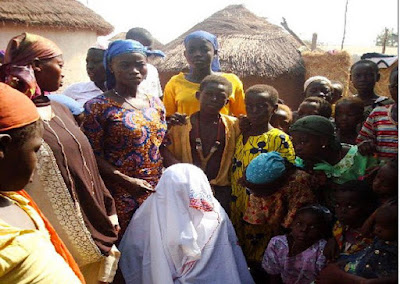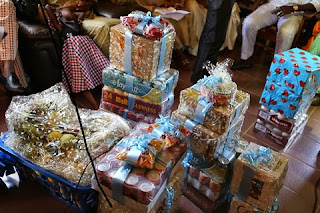The Intriguing Fanti Traditional Marriage( Mfantse Aware)
HISTORICAL ANTECEDENT OF MARRIAGE
By: John Annan (DCS20676)
Marriage
is
one of the oldest social institutions that have lasted for years. With millions
of year old as a social practice recognized worldwide, it has been a major
factor to family continuity from generation to generation. Dating to biblical
thought, the word of God in Genesis 2:24 say therefore a man shall leave his
father and mother and hold fast to his wife, and they shall become one flesh.
Again in Ephesians 5:31, a man leaving the family house to tie with a woman is
also highlighted there. This in a way means to Christians that, marriage is not
a mere knowledge of mankind, but it is divine.
In other school of
thought, marriage came about in the early stages of human live, where mankind
abandoned substantial farming to producing farm products in large quantities.
This assertion is back by a theory propounded by Charles Robert Darwin, an
English naturalist and geologist in 1871. This theory talks about the starting
of human life and how mankind evolve from the early stone age to the stage where
man needed to build a family. Whether or not the world believes the theory
propounded by Charles Darwin, the significance of marriage is one that cannot
be underestimated globally.
FANTE TRADITIONAL
MARRIAGE
Just as to many in the
world, marriage ceremony is one practice many Ghanaian communities like the
fante of the akan traditional group hold in high esteem. Fante is a tribe among
the Akan ethnic group in Ghana. This tribe is largely based at the central
region of Ghana and characterizes a major part of Ghana. The fanti tradition
sees marriage institution as one that build-up their family system, hence the
ceremony is a delight to watch.
 |
| fig. 1 Bride and Groom |
A man, who is fully
grown, has the financial muscles, ready to live with a woman informs his parent
about a lady he is interested in, gives information about her to the parents to
go see the parents of the lady and ask of her hand in marriage on half of their
son. The parents do not go to the potential in-law’s parent by themselves, but a
representative from their family embarks on that journey on their behalf. The
representatives return to the groom to be and his parents to tell them of the
answer gotten from the journey they took. In case they were given the green light
that the lady is available for marriage, then the next preparation is what the
fantis call “k)k))k)” meaning
knocking ceremony.
At this stage, the
monetary aspect of the marriage ceremony is displayed. The groom’s family pays
a knocking fee which differs from family to family. The groom’s family gather
together at the parent house of lady and are accepted into the house through
the knocking fee. The bride’s family can alone proceed with the ceremony when
the groom’s family again pay acceptance fee to the knocking fee. The bride’s
family then gives a list to the visiting family. This list includes all things
the lady and her family will demand from the groom’s family. This may include
head money which is locally called “Tsir
Nsa” in the fanti dialect, clothes, scarves, pants and all other items that
will beautify the bride in the marriage.
 |
| fig. 2 some items parceled for marriage |
The list also has a
portion where the groom pays some amount and provides some presents to the
father, mother and the family of the bride respectively. The brothers of the bride
are not left out. They receive money from their brother-law which is locally
dubbed “akonta sikan”. These and
many other items are given according to family preferences to bring to the
bride’s family for the ceremony to carry on. A date is settled on for the two
families to meet and have the ceremony performed.
On the day of the
ceremony, the families meet at the house of the bride once more, nicely dressed
and in joyous mood to celebrate their family members. A priest prays for the
families, advises are given to the newly couple from both families. Witnesses
for the marriage from both families are shown to the people at the ceremony and
all other activities are done.
photos source: Naayooquatey.com
Youtube.com
photos source: Naayooquatey.com
Youtube.com



Comments
Post a Comment